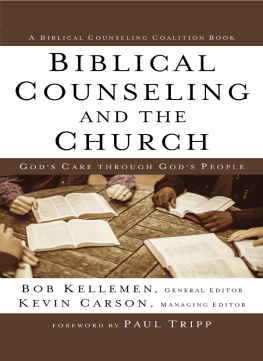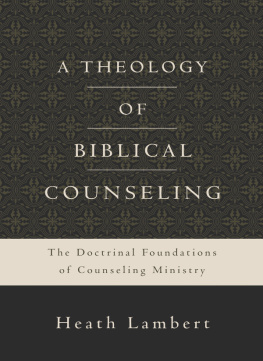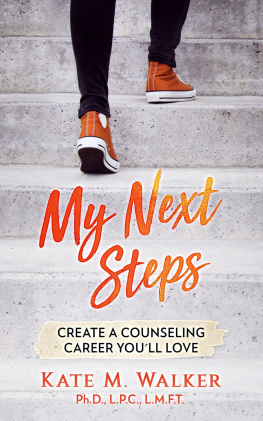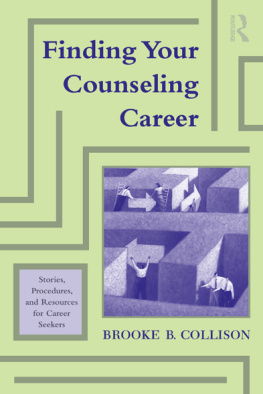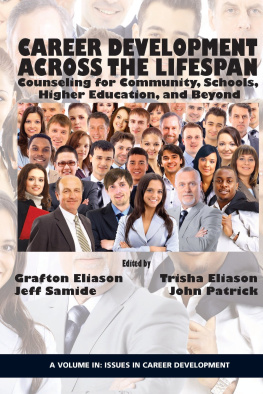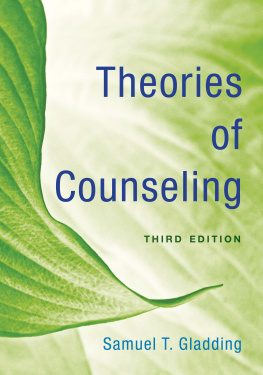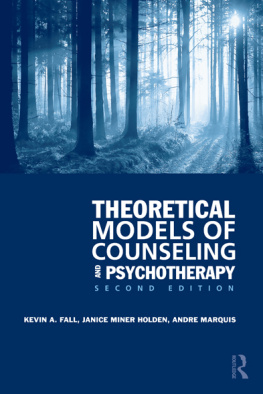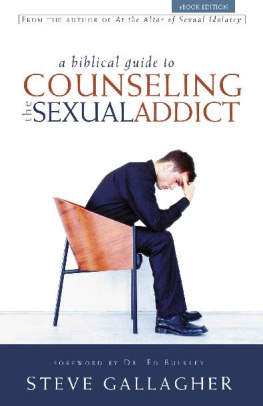Gysbers - Career Counseling
Here you can read online Gysbers - Career Counseling full text of the book (entire story) in english for free. Download pdf and epub, get meaning, cover and reviews about this ebook. year: 2014, publisher: Wiley, genre: Home and family. Description of the work, (preface) as well as reviews are available. Best literature library LitArk.com created for fans of good reading and offers a wide selection of genres:
Romance novel
Science fiction
Adventure
Detective
Science
History
Home and family
Prose
Art
Politics
Computer
Non-fiction
Religion
Business
Children
Humor
Choose a favorite category and find really read worthwhile books. Enjoy immersion in the world of imagination, feel the emotions of the characters or learn something new for yourself, make an fascinating discovery.

Career Counseling: summary, description and annotation
We offer to read an annotation, description, summary or preface (depends on what the author of the book "Career Counseling" wrote himself). If you haven't found the necessary information about the book — write in the comments, we will try to find it.
Career Counseling — read online for free the complete book (whole text) full work
Below is the text of the book, divided by pages. System saving the place of the last page read, allows you to conveniently read the book "Career Counseling" online for free, without having to search again every time where you left off. Put a bookmark, and you can go to the page where you finished reading at any time.
Font size:
Interval:
Bookmark:
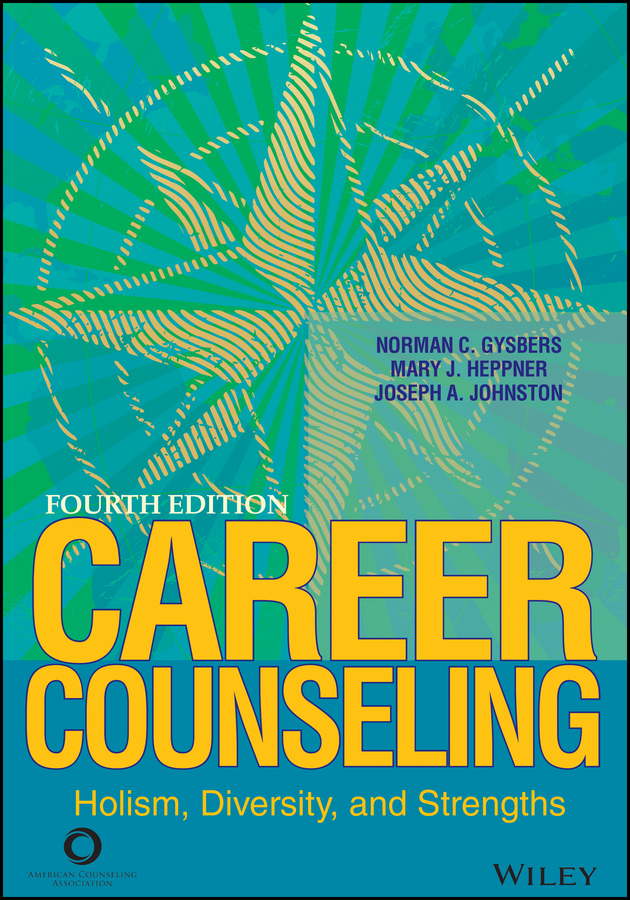
Copyright 2014 by the American Counseling Association. All rights reserved. Printed in the United States of America. Except as permitted under the United States Copyright Act of 1976, no part of this publication may be reproduced or distributed in any form or by any means, or stored in a database or retrieval system, without the written permission of the publisher.
10987654321
American Counseling Association
5999 Stevenson Avenue
Alexandria, VA 22304
Associate Publisher Carolyn C. Baker
Production Manager Bonny E. Gaston
Copy Editor Susan B. Klender
Editorial Assistant Catherine A. Brumley
Cover and text design by Bonny E. Gaston.
Library of Congress Cataloging-in-Publication Data
Gysbers, Norman C.
Career counseling: holism, diversity, and strengths/Norman C. Gysbers, Mary J. Heppner, Joseph A. Johnston.Fourth Edition.
pages cm
Includes bibliographical references and index.
ISBN 978-1-55620-333-6 (alk. paper)
1. Vocational guidanceStudy and teaching. 2. Personality and occupation. I. Heppner, Mary J. II. Johnston, Joseph A. III. Title.
HF5381.G95 2014
158.7dc23
2013037326
To all our graduate students
and colleagues worldwide who have
supported and encouraged the
development and writing
of this book
The USA is bigger, older, more Hispanic and Asian and less wedded to marriage and traditional families than it was in 1990. It also is less enamored of kids, more embracing of several generations living under one roof, more inclusive of same-sex couples, more cognizant of multiracial identities, more suburban, less rural and leaning more to the South and West.
Nasser & Overberg, 2011
Vast and far-reaching changes are taking place in the nature and structure of the social and economic systems in which people live and the industrial and occupational structures in which they work (U.S. Department of Labor, 2013). The values and beliefs individuals hold about themselves, about others, and about the world are changing too. More and more people are seeking meaning and coherence in their lives. Our society also is becoming multiracial, multilingual, and multicultural. Women are entering the labor force in record numbers, and men are questioning traditionally held beliefs about their roles.
Demographic trends in the 2000s showed the continuing separation of family and household because of factors such as childbearing among single parents, the dissolution of cohabiting unions, divorce, repartnering, and remarriage. The transnational families of many immigrants also displayed this separation, as families extended across borders. In addition, demographers demonstrated during the decade that trends such as marriage and divorce were diverging according to education. Moreover, demographic trends in the age structure of the population showed that a large increase in the elderly population will occur in the 2010s. Overall, demographic trends produced an increased complexity of family life and a more ambiguous and fluid set of categories than demographers are accustomed to measuring.
Cherlin, 2010, p. 403
Far from being a standard or rote procedure, career counseling, in response to these social and economic changes, has become a dynamic, creative, and highly individualized process. The continually emerging and evolving ideas about the nature and structure of individuals career development are providing practitioners with new ways to understand and work with clients of all ages and circumstances. To keep abreast of these changes you may wish to update your knowledge about the ever-changing contexts and conditions in which people will live and work in the 21st century. You may wish to revisit and revitalize how you conceptualize the career development of individuals and the structure of the career counseling you do with clients. You may be looking for specific interventions, including qualitative and quantitative assessments, to help you and your clients gather information about their goals and problems, to work together to understand and interpret this information, and to choose interventions that will assist them in reaching their goals or resolving their problems.
The purpose of this book is to help you expand and extend your understanding of individuals career development as well as your vision of career counseling and the skills and techniques in your career counseling repertoire. Specifically, this book is designed to help you update and add to the knowledge and skills you already have. It will help you better understand and interpret client information gathered and behavior observed during career counseling by using concepts from traditional and new and emerging postmodern conceptualizations of career development. It also will help you better understand and interpret client information and behavior in terms of life career themes, or the ideas, beliefs, attitudes, and values clients hold about themselves, others, and the world in which they live. Finally, it will help you assist clients of all ages and circumstances to more effectively understand and use such information and behavior in their quest to achieve their career goals or resolve their career concerns.
This book incorporates the strongest parts of the traditional understanding of the career counseling process with the ever-changing social and economic demands of the 21st century. In addition, it incorporates new and emerging postmodern career development concepts into career counseling practices, further strengthening your understanding of the career counseling process. This is important, because we believe that the process of career counseling has long been overlooked, as if this particular brand of counseling were devoid of process. We propose a process for career counseling, and we focus particular attention on how this process can be helpful in expanding options and empowering the authentic life choices of women; men; racial and ethnic minorities; gay, lesbian, bisexual, and transgender clients; and individuals with disabilities. Although we are keenly aware that these categories do not cover all forms of diversity in human life, we choose to highlight them and hope that much of what we express is transferable to the issues of other diverse groups as well.
To help you gain these specific skills, this book brings together selected concepts and techniques from the disciplines of counseling, psychology, sociology, and economics in general, and the discipline of career psychology specifically. It is a book for you if you are looking to enhance your theoretical knowledge and expand your practice skills through an in-depth examination of specifically selected career counseling interventions, including various qualitative and quantitative assessments. It is a book for you if you are looking to update and expand your ability to gain insights into client behavior, to develop hypotheses about such behavior, and to apply this knowledge in the selection of effective career counseling techniques and assessments.
This book presents a theory-based, practice-focused approach to career counseling. It presents career counseling holistically using life career development as a way to view and understand overall human development in general and career development specifically. It is a strengths-based, theoretically sound conception of career counseling that is practitioner friendly and very usable with clients of all ages and circumstances. Specific attention is given to the critical life contexts in which career development unfolds and career counseling takes place, including gender, culture/race, sexual orientation, social class, spirituality, and disability. Specific attention is also given to the ever-changing work world, including the implications of globalization and the interactions of work and family.
Next pageFont size:
Interval:
Bookmark:
Similar books «Career Counseling»
Look at similar books to Career Counseling. We have selected literature similar in name and meaning in the hope of providing readers with more options to find new, interesting, not yet read works.
Discussion, reviews of the book Career Counseling and just readers' own opinions. Leave your comments, write what you think about the work, its meaning or the main characters. Specify what exactly you liked and what you didn't like, and why you think so.

